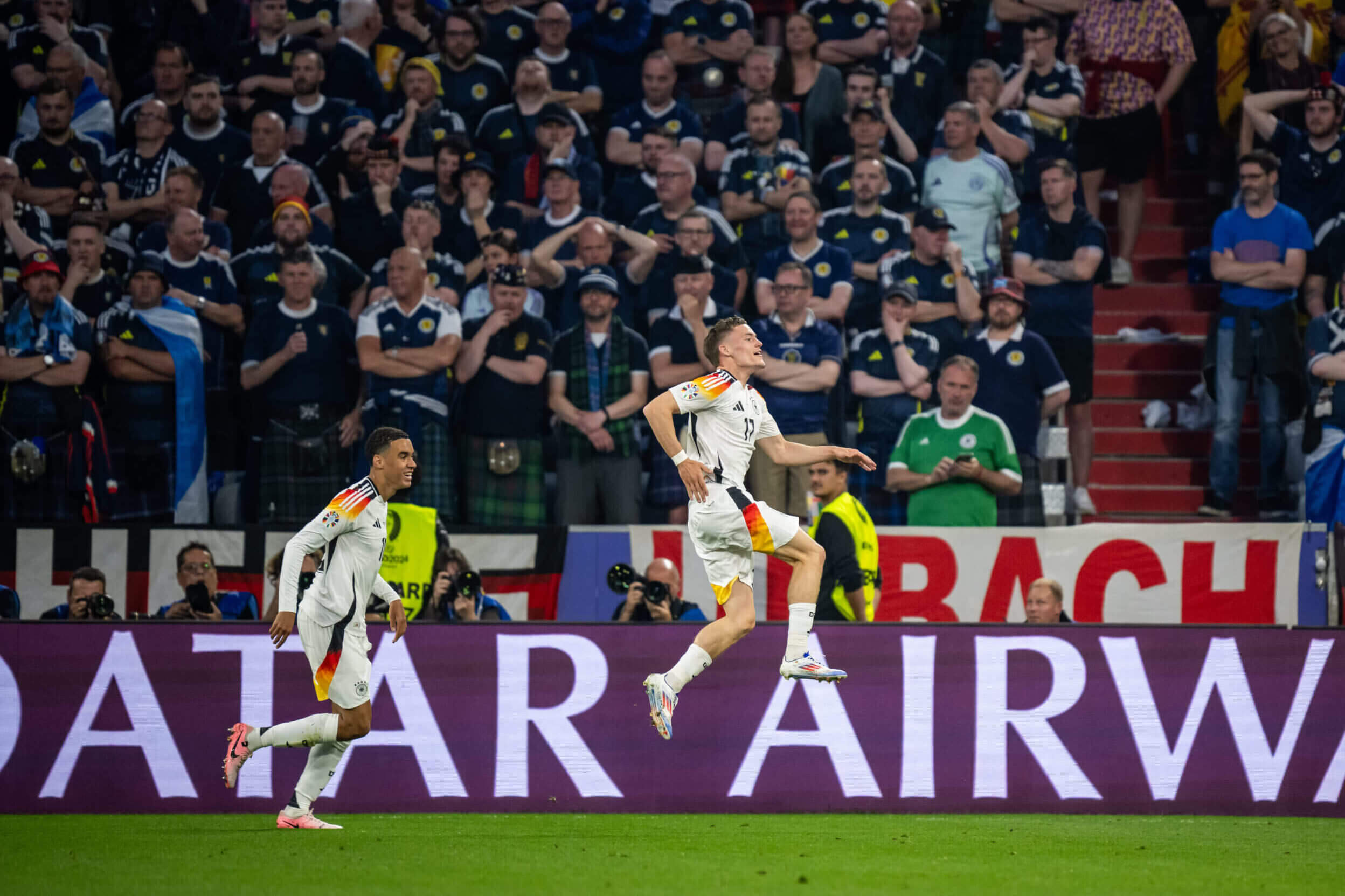There are basically two classic ways to open a major tournament. The first way is a serious shock, like when Cameroon defeated Argentina in 1990, or when Senegal did the same to France in 2002. The alternative is for a host nation to start with a bang, with a big moment — think Siphiwe Tshabalala in 2010, or Philipp Lahm in 2006.
So after some somewhat underwhelming openers — Russia and Qatar weren’t exactly neutral’s favourites as hosts, and Italy in 2021 weren’t solely hosting the tournament which was played in front of half-empty stands anyway — Germany v Scotland felt ripe for one of the two.
It didn’t take long to work out which way things were going to go.
This was a statement of intent from Germany, both for the next few weeks and the next few years. Their opening goals came from Florian Wirtz, man of the Bundesliga season, and Jamaal Musiala, man of the match. It was the first time in the history of the European Championship that two players aged under 21 had scored for the same side in a game.
A more cautious, traditional manager might have selected the attacking trio that finished this game. A proper striker in Niclas Fullkrug. A pure speedster in Leroy Sane. A guarantee of stereotypical German efficiency from Thomas Muller. But Julian Naglesmann has been more daring, fielding Wirtz, and Musiala, and having them play off Kai Havertz. All three players like to drift into positions between the lines; there’s a danger they could have tripped over one another.
Nagelsmann’s selections were bold and effective (Photo: Tom Weller/picture alliance via Getty Images)
But in the opener they played fluidly, alternated positions and ran in behind too — Scotland’s key player in the first half was goalkeeper Angus Gunn, because he kept on having to sweep up outside his box. Germany were bypassing Scotland, not simply playing in front of them.
This game was done by half-time, and the three attackers scored all three of the first-half goals.
The first came when Wirtz’s powerful low shot squirmed beyond Gunn and bounced in off the post. More notable than the shot, or the manner it went in, was the way Wirtz was able to collect the ball on the edge of the box from Joshua Kimmich’s low cut-back. Those type of balls seemed a constant theme of Germany’s play, with Maxi Mittelstadt playing similar deliveries from the opposite flank to good effect. Germany don’t have a pure penalty box poacher with this starting trio, but they have plenty of players who can find space on the edge.
Musiala scored the second, crashing home after Havertz had played the ball back to him. Again, the interesting thing was that Havertz was going in behind, stretching the play and receiving a good penetrative pass from midfield, with Ilkay Gundogan slipping him in. Still a provider more than a goalscorer, Havertz laid the ball back neatly for a first-time finish.
But the third goal was arguably the most interesting. OK, it was eventually a penalty, converted smoothly by Havertz after Ryan Porteous’ wild challenge on Gundogan. But go back to the build-up, and you’ll find Musiala popping up in the inside-left channel, joining Wirtz in that zone. These players have freedom to roam, to combine and to work passing combinations together in tight spaces. Havertz and Musiala have played at previous tournaments, but this feels like a new-look Germany, with Nagelsmann able to take credit for that, albeit at this early stage.

Porteous takes out Gundogan (Photo: Andrew Milligan/PA Images via Getty Images)
Granted, Scotland put up little fight, and there will doubtless be times when this front three do look a little narrow. But the key is that Germany do have options from the bench — not carbon copies of the starters, but genuine tactical alternative. Fullkrug blasted in the fourth, Sane stayed wider than the starting trio, and Muller floated around elusively, as always.
By the time Emre Can added the fifth, after Rudiger’s slapstick own goal, the scoreline almost seemed irrelevant. But 5-1 was, if anything, not an accurate reflection of Germany’s dominance.
And Germany, you sense, needed this type of start to the competition. After a dreadful showing at the last two major tournaments, and the inevitable period of low-intensity friendlies that comes with hosting a tournament, Germany didn’t feel particularly confident about its national side. But the flags and the shirts around Munich, the huge number of fans who got to the stadium three hours before the game, and the brilliant atmosphere inside the ground shows that people were willing to come along for the ride. Nagelsmann didn’t merely want a result; he wanted a performance to give the tournament lift-off. When he conducted his post-match interviews with German television, long after the game had finished, groups of fans gathered around to chant ‘Julian! Julian!’, when he exited.
The other 22 teams in this competition will have been watching this German performance — maybe we can extend that to 23, given how passive Scotland were. Perhaps they will have been afraid at Germany’s quality. But maybe it will prove a tournament-wide confidence boost: this was a demonstration that open, fluid, intricate football can get rewards. The tournament is up and running. A whole month of this, and Euro 2024 will be a cracker.
(Photo: Kevin Voigt/GettyImages)

